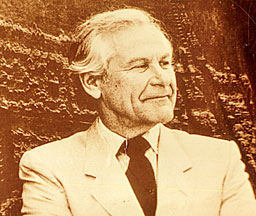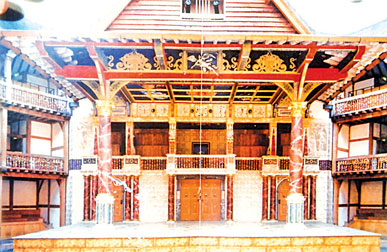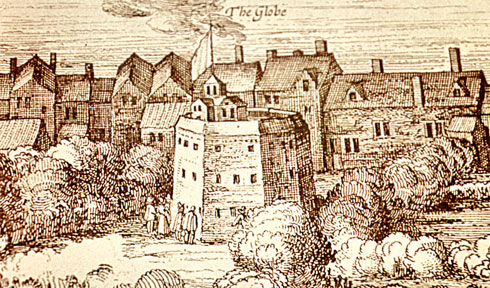Theatres as tribute to Shakespeare
by Gwen Herat
As theatre started flourishing and audience-interest growing, actors
and directors indicated their desire for more improvised theatre on
which to lay down Shakespeare's plays. They needed plush settings as
well as properly lit stages to support various scenes with props on
which the plays' popularity would grow and enhance the story and the
dialogue value.
 |
|
The late Sam Wanamaker, Hollywood
actor and director, and devotee of Shakespeare's
plays, arrived in England in 1940 and built the present
Globe theatre in its original site. |
Gone were the days of bare stages and travelling theatre with
intensity cast over acting which were to produce thespians in the near
future. Theatre had to be part of their culture that would earn its
place in British history, eventually.
The old Vic
In 1818 a theatre named Royal Coburg was built at the junction of
Waterloo Road and the Cut South of the Thames and later renamed the
Royal Victoria and in its place stand the Old Vic. This theatre had a
turbulent early history but under the guidance of Emma Cons, it
modulated in 1880 to the Royal Victoria Hall. Con's neice, Lilian Baylis
volunteered to help.
She was just 23 years and in 1914, chose to present Shakespeare as
well as popular operas in the theatre with its gas-lit stage. This went
well under directors such as Ben Greet and Robert Atkins. By the autumn
of 1923 the tercentenary year of the first Folio every play in the canon
had been performed by actors such as Sybil Thorndyke, Ion Swinley, and
Edith Evans. A new director, Harcourt Williams in 1929 commissioned the
young John Gielgud as the leading man during two renowned seasons. With
the help of such big names as that of Peggy Ashcroft, Tyrone Gutheri,
Charles Laughton, Flora Robson and many others the theatre established
itself in the 1930s. In 1937 Laurence Olivier's Hamlet and Henry V
announced the mergence of a major Shakespeare theatre. After much
dedication and perseverance to promote theatre as a vibrant image,
Lillian Baylis died later the same year but not before she saw the Vic
became, in effect, a National Theatre.
Then came the devastation; the theatre was bombed and the company
moved to the New Theatre (known as Albery Today) from 1944 to the spring
of 1950.
Later on, under the direction of Oliver, Richardson and John Burrell,
were the years of Oliver's famous Richard III (1944) and the two Henry
IV chronicles (1945). Steadily Shakespeare characters emerged gloriously
to capture the imagination of the audience. In 1949 another Old Vic
sprang up at the Theatre Royal in Bristol and Hamlet was directed by
Micheal Redgrave.
This was followed by the opening of the Waterloo Road theatre under
Hugh Hunt. With the passing of many summers, The Old Vic was the
monument for other subsidiary theatres, some of which survived while
others faded away. The National Company left for its new theatre while
the Prospect Company appeared under the Old Vic. Prospect became known
officially as the Old Vic company in 1979.
The National Theatre
 |
|
The magnificent open
air stage of the present Globe built by Wanamaker. |
Until the completion of their own theatre which took nearly 13 years
from 1963, the National Theatre put up with the Old Vic in readiness at
the South Bank. Despite the National Theatre being suggested as far back
as 1848, the work did not commence until 1969, after a false start in
1951. The first chairman of the South Bank Theatre Board was set up in
1962 to overseas the building of the theatre. The three theatres
contained nearly 2500 seats. Lord Oliver Lyttelton was director from
1963-1973 followed by Sir Peter Hall who took over until 1988. It was
also in 1988 that the National Theatre gained a Royal charter.
Open Air Festival
Twelfth Night was the first play to be launched at the Open Air
Festival at Regent's Park by an Australian actor who masterminded the
idea, Sydney Carrol along with director, Robert Atkins.
This was in 1932 and despite the losses of $ 560, Carrol was given
the opportunity to establish a theatre in the Inner Circle adjoining
Queen Mary's Garden. The open air stage was backed by a screen of
popular artistes with a marquee on hand for inclement weather. Carrol
who reshaped the stage, planted tress and hired deck chairs along with
long benches that drew a first audience of nearly 2500 people. But he
lost $3000 but he was not disappointed. Determined to secure a financial
future, he sought funding from the Arts Council. A year later, the
company had its first overseas tour. Director, David Conville associated
with the theatre for more than thirty years featuring some of the world
's leading thespians.
English Shakespeare Company
The English Shakespeare (ESC) was established in 1986 by director,
Michael Bogdanov, along with actor, Michael Pennington. Their inaugural
production was Henry IV. They toured throughout the world to great
success and acclaim and added four new productions to form the War of
Roses which is Shakespeare's complete history cycle... for which Michael
Bogdanov won the Oliver award as Best Producer. Over fifteen plays were
performed in the next six years including a tour to four African
countries. It included a special adoption of Macbeth along with
Coriolanes the winter's Talee.
The Globe
The most popular of all theatres, especially with the modern
audiences, was the Globe Theatre which opened in 1599 and in which
Shakespeare had a share. It is sited at Southwark on the south bank of
the Thames. In 1963, The Globe burnt down accidentally during a
performance of Henry III, was rebuilt and opened again in 1614. Thirty
years later, the Puritans pulled it down.
 |
|
The original Globe that
was mysteriously burnt down |
Then came the saviour of the theatre, Sam Wanamaker, Hollywood actor
and director and a passionate devotee of Shakespeare's plays. Arriving
in England, he started looking over the original sight of the Globe in
1940. But the locals knew little about its history. However, he found a
plaque that indicated the site and went about determined to rebuild The
Globe that was going to be his tribute to the Bard whose works
fascinated him. The Shakespeare's Globe Trust was set up with Prince
Philip as Patron and Wanamaker as Chief Executive. A fund-raising
committees were set up in United States, Canada, New Zealand, Australia,
Japan India and Germany. With friends of Shakespeare's Globe, all
financial hurdles were overcome and the final phase of the building
started in June 1992. Tragically Wanamaker died in 1993 deprived of
seeing his dream reaching the last brick. But the whole world knows that
the Globe is his beautiful dream come true.
Stratford-Ontario
One of the greatest tributes paying homage to the non-Canadian
William Shakespeare is the Stratford - Ontario that fired the
imagination of a local journalist, Tom Patterson on the possibility of
an annual Shakespeare Festival in the Canadian Stratford. It took place
at as small Ontario town by the Canadian Avon. Tyronne Gutherie tempted
by unexpected ideas, agreed immediately to travel from England to direct
an Elizabethen play evolved by Tanya Moiseiwitch. Originally, the
festivals were held in a large tent but by summer 1953, Alec Guinness
acted as Richard III and Irene was Helena in Alls Well That Ends Well
which was one of Gutheri's favourite plays. It was the beginning of a
dream to all Shakespeare-loving Canadians and became the home for all
North American audiences.
There were a variety of administrators of high profile like Tyronne,
Gutherie, Michael Laughton, Jean Gascon and Robin Phillips.
The stage remained in its original form as a Stratford creation and
during its thirty years the Shakespeare Folio was very consistent. The
summer festival was given international fame to its inconspicuous town
and is still under director, Robin Phillips.
|



